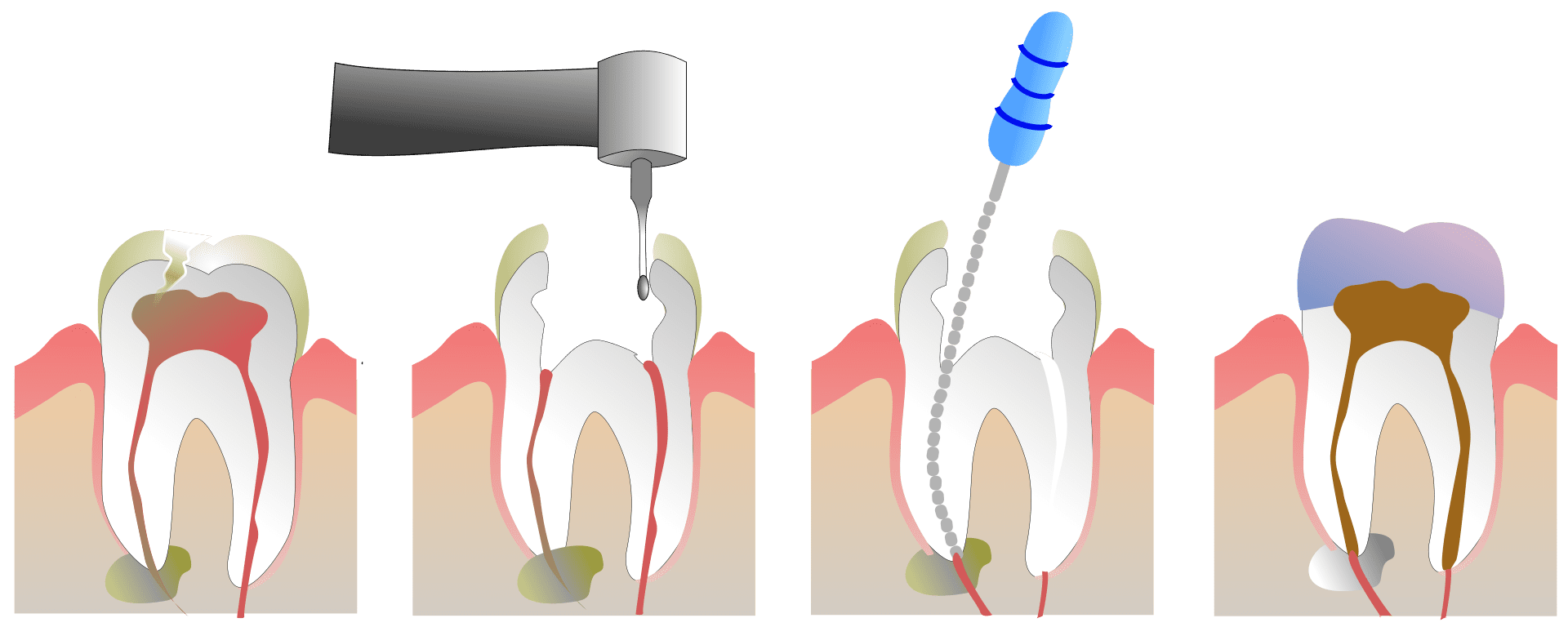
Root Canal Treatment: What You Need to Know
Root canal treatment, also known as endodontic therapy, is a dental procedure that is performed to treat a diseased or damaged tooth. The goal of the treatment is to save the natural tooth and prevent the need for extraction. While the thought of a root canal may cause some people to cringe, it is actually a common and routine procedure that can alleviate pain and discomfort and restore the health of your teeth.
What is a root canal?
A tooth is made up of several layers, including the outer enamel, the inner dentin, and the pulp at the center of the tooth. The pulp contains nerves and blood vessels that help to keep the tooth healthy. When the pulp becomes infected or damaged due to decay, cracks, or trauma, it can lead to pain, swelling, and even abscesses. A root canal treatment involves removing the infected or damaged pulp from the tooth, cleaning and disinfecting the inside of the tooth, and then sealing it to prevent further damage or infection.

What are the signs that you may need a root canal?
If you are experiencing any of the following symptoms, it may be a sign that you need a root canal:
- Persistent pain in a tooth, especially when chewing or biting
- Sensitivity to hot or cold temperatures, even after the source of the temperature has been removed
- Swelling or tenderness in the gums surrounding a tooth
- Discoloration or darkening of a tooth
It is important to seek prompt dental care if you are experiencing any of these symptoms. Delaying treatment can lead to more serious dental issues and may ultimately result in the need for extraction.
What can you expect during a root canal treatment?
A root canal treatment is typically performed by an endodontist, a dentist who specialises in treating the interior of teeth. The procedure is performed under local anaesthesia to minimise pain and discomfort. The first step is to remove the damaged or infected pulp from the tooth. Once the pulp has been removed, the inside of the tooth is thoroughly cleaned and disinfected. The final step is to fill and seal the tooth to prevent further damage or infection. Depending on the extent of the damage, a temporary or permanent filling may be used.
After the procedure, you may experience some mild discomfort or sensitivity, which can be managed with over-the-counter pain relievers. In most cases, you can return to your normal activities the same day as the procedure.
After the Procedure
After the root canal treatment is complete, it is important to take good care of the tooth to prevent further damage or infection. You may experience some sensitivity or mild pain after the procedure, but this should subside within a few days. Your dentist will provide instructions on how to care for your tooth and may prescribe medication to manage any discomfort.
In most cases, a permanent restoration such as a crown or filling will be placed to protect the tooth and restore its function. It is important to maintain good oral hygiene practices, including brushing and flossing regularly and visiting your dentist for regular check-ups and cleanings.
Why choose Poland for your root canal treatment?
If you are in need of a root canal treatment, you may be concerned about the cost of the procedure. Root canal treatment can be expensive, especially in countries like the UK and the US. This is where dental tourism comes in. Poland has become a popular destination for dental tourism due to its high-quality dental care and affordable prices. You can expect to pay significantly less for a root canal treatment in Poland than you would in many other countries, while still receiving the same level of care and expertise.
In addition to the cost savings, Poland is home to many highly skilled and experienced dentists who specialise in endodontic therapy. Many dental clinics in Poland are equipped with state-of-the-art technology and offer a wide range of dental procedures, including root canal treatments. Whether you are a local resident or a dental tourist, you can expect to receive top-quality care in a comfortable and modern setting.
Root canal treatment may sound intimidating, but it is a routine procedure that can save a tooth and relieve pain. If you are experiencing symptoms such as tooth pain or sensitivity, it is important to schedule an appointment with your dentist to determine the underlying cause and determine the best course of treatment. With advances in technology and techniques, root canal treatment is now more efficient and comfortable than ever before, making it a safe and effective option for restoring your dental health.
FAQs about Root Canal Treatment
Root canal treatment is a treatment aimed at the infected pulp of a tooth which results in the elimination of infection and the protection of the decontaminated tooth from future microbial invasion. Root canals, and their associated pulp chamber, are the physical hollows within a tooth that are naturally inhabited by nerve tissue, blood vessels and other cellular entities. Together, these items constitute the dental pulp. The treatment involves the removal of these structures, the subsequent shaping, cleaning, and decontamination of the hollows with small files and irrigating solutions, and the obturation (filling) of the decontaminated canals.
How long does Root Canal Treatment take?
The procedure is often complicated, depending on circumstances, and may involve multiple visits over a period of weeks. Usually, the length of time required is 60-90 minutes per session (depending on the tooth and the number of canals) with 1 to 3 treatments required.
Why is Root Canal Treatment necessary?
Root canal treatment enables the endodontist to help preserve the longevity and function of the tooth.
How much does Root Canal Treatment cost in Poland?
Root Canal Treatment costs from £115 (1 x root) to £175 (3 x roots). Difficult endodontic cases plus microscope will cost an extra £20 to £40 per root canal.